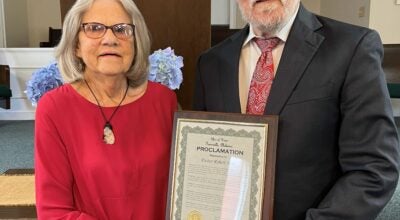County native opens Brewton hearing clinic
Published 12:45 pm Monday, March 7, 2011
SPECIAL TO THE ADVOCATE
BREWTON – Butler County native and Audiologist Angelene Naro has opened a hearing clinic on the campus of D.W. McMillan Memorial Hospital, and with her comes years of experience that includes a multi-physician ENT clinic, a university clinic, and satellite offices in remote areas.
It’s not the setting, however, that gives Naro the motivation to do what she does, she said, it’s the idea that improving a person’s hearing can change that person’s quality of life.
“Loss of hearing can have serious implications,” Naro, owner of Naro Audiology & Hearing Solutions said. “It’s a common problem associated with aging, but because it’s usually gradual, we don’t realize it’s happening.”
Naro is the daughter of Jimmy and Vickie Hanks and grew up near Georgiana. She said her education started with the “best teacher in the world, Mrs. Glenda Stone” at Fort Dale, but she graduated from Greenville Academy in 1995. As a senior, she worked with local physician Dr. John Hollis.
Naro said that in today’s society, people are exposed to a lot more noise, especially children and teens who listen to music at loud levels through headphones and car stereos.
“Hearing loss is beginning to affect people at all ages,” she said. “We now recommend that people have a baseline hearing test by age 50.”
The effects of hearing loss show up in so many ways, Naro said. The most common complaint she hears is when a patient says, “I can hear, but I can’t understand.” Other signs include ringing in the ears (tinnitus), and playing the TV loudly.
“The effects of hearing loss show up in so many ways, and can lead to isolation and depression” Naro said. “People don’t tell you things they’ve wanted to because it’s too much effort. They quit going to church. They quit playing bridge.”
Consequently, hearing loss can have social, physical and psychological implications. For instance, hearing loss sometimes gets misdiagnosed as the early stages of dementia because the person responds inappropriately or not at all.
“Another instance might be that a person gets mixed up on his medications and ends up taking them inappropriately because he didn’t hear the instructions and was too embarrassed to ask,” Naro said.
“Safety is also a concern when hearing loss means a person can’t hear sirens, alarms, traffic noises, or even a knock on the door,” Naro said.
Fortunately, the technology associated with hearing devices has advanced to the point where patients are more likely to wear them without fear of being embarrassed, Naro said.
“My patients have included judges, doctors, dentists, teachers, and truck drivers, all of who benefited greatly from resolving their hearing loss,” she said.





